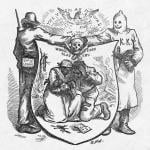In the first of his Hulsean lectures, Richard Hays claims (Reading Backwards) that “many ‘mainstream’ Protestant churches today are . . . naively Marcionite in their theology and practice: in their worship services they have no OT reading, or if the OT is read it is rarely preached upon. Judaism is regarded as a legalistic foil from which Jesus has delivered us” (5). This has “had a disastrous effect on the theological imagination of many Protestant churches, at least in... Read more
















